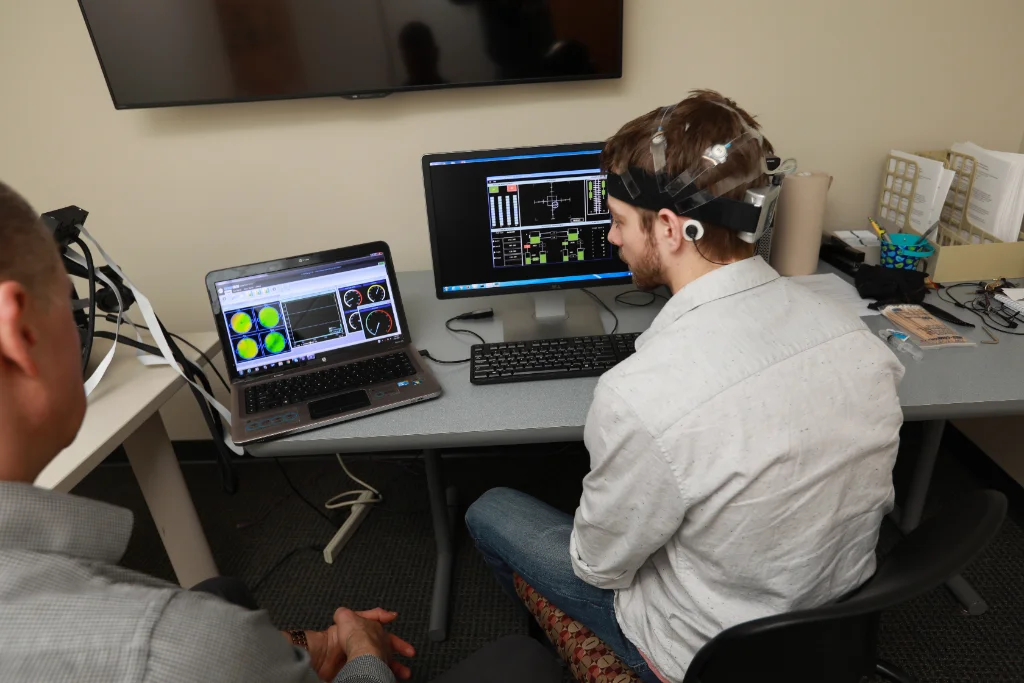
Psychology vs. Psychiatry: Learn About Their Differences
Mental health is as crucial as physical health, yet it is often misunderstood.
Request Information
Various professionals dedicate their careers to understanding and treating mental health issues, but their roles and approaches can vary significantly. Among these, psychologists and psychiatrists are frequently mistaken for each other by those unfamiliar with the nuances of each field.
Psychologists and psychiatrists play vital roles in mental health care, but their training, approaches and treatment methods vary. Whether you're exploring the nuances between these professions for personal interest or career aspirations, understanding the differences is key. Read on as we delve into the specifics of psychology and psychiatry and discover which path might align best with your aspirations and professional goals.
What is Psychology?
Psychology refers to the scientific study behavior and mental processes. It explores various aspects of human experience, from cognitive processes to emotional responses and social interactions.
As a distinct scientific discipline, psychology emerged in the 19th century. It evolved from philosophical inquiries into the mind to a formal field of study, marked by systematic investigations into behavioral and cognitive processes. This shift was largely driven by the establishment of research methods that distinguished psychology from other sciences.
What is Psychiatry?
Psychiatry is a branch of medicine focused on diagnosing, treating and preventing mental health disorders. Psychiatrists are medical doctors who can prescribe medications and use a range of therapeutic techniques to manage mental illnesses.
The roots of psychiatry are deeply embedded in the medical traditions of the early 19th century. The term "psychiatry" was first coined by Johann Christian Reil, a German professor of medicine, in 1808. The term literally means "medical treatment of the soul," reflecting the evolving approach to understanding and treating mental illness.
What's the Difference Between a Psychologist and a Psychiatrist?
While both psychologists and psychiatrists play crucial roles in mental health care, their training, approaches and methods of treatment often differ significantly. Below, we'll focus on the distinctions between these two professions, helping to clarify their unique functions and the settings in which they operate.

Education
Firstly, the educational trajectories of psychologists and psychiatrists are structured to suit the distinct demands of their professional roles. Both are rooted in a deep understanding of the human mind but diverge in focus and methodology.
Psychologists typically begin their academic journey with an undergraduate degree in psychology or a closely related discipline. Then, this foundation is built upon through a master's degree, which focuses on advanced theories and practical applications of psychological practices. The culmination of a psychologist's education is typically a doctoral degree in psychology. This advanced degree requires four to six years of dedicated study, including intensive research, clinical internships and a comprehensive examination process.
On the other hand, psychiatrists are a type of doctor; therefore, they follow a path that integrates a medical degree with a psychiatric specialization. After completing a bachelor's degree, which often includes pre-medical or scientific coursework, aspiring psychiatrists enter medical school. In this four-year program, they gain a broad understanding of medical principles and practices.
After earning their medical degree, these future psychiatrists undergo a four-year residency in psychiatry. This period involves specialized training in diagnosing, treating and preventing mental illnesses through a combination of theoretical learning, practical rotations and direct patient care. This extensive medical training enables them to prescribe medications, perform medical procedures and manage the complex relationship between mental and physical health, setting them apart from psychologists.
Skills
Both psychologists and psychiatrists require a set of core skills such as empathy, effective communication and the ability to assess and develop treatment plans. However, due to differences in their training and responsibilities, each profession also emphasizes certain specialized skills.
Skills Emphasized in Psychology
- Advanced research skills to study brain function and behavior
- Administering and interpreting psychological tests and assessments
- Proficiency in non-medical therapies, such as cognitive-behavioral therapy (CBT) and psychoanalysis
- Conducting detailed behavioral analyses
- Developing and monitoring treatment plans without medication
- Teaching psychological concepts and findings
- Expertise in conducting psychotherapy and counseling sessions
Skills Emphasized in Psychiatry
- Medical knowledge to understand the biological basis of mental disorders
- Diagnosing mental health conditions based on medical evaluations
- Managing psychiatric medications and understanding their interactions
- Conducting physical examinations and interpreting lab tests
- Managing co-occurring physical and mental health conditions
- Training in emergency psychiatry for acute mental health crises
- Performing medical procedures related to mental health treatment
Roles and Responsibilities
Psychologists and psychiatrists both play important roles in the field of mental health, employing various methods to improve patients' psychological well-being. They share a common goal: to alleviate mental distress and enhance mental health.
Both are trained to assess psychological issues, develop treatment plans and provide therapy. They often collaborate, referring patients to one another to ensure they address all aspects of a patient's health needs. However, psychologists primarily focus on evaluating and treating mental and emotional disorders through non-medical means, whereas, as medical doctors, psychiatrists have the authority to perform a broader range of medical procedures and prescribe medication.
Psychologists often conduct detailed psychological assessments, which include interviews, surveys and standardized testing to understand a patient's condition and the root causes of their distress. Based on these assessments, psychologists engage in various forms of psychotherapy, including cognitive-behavioral therapy (CBT), psychoanalytic therapy and counseling. These treatments aim to modify behavior and thought patterns to help patients manage or overcome their issues.
On the other hand, psychiatrists' medical training allows them to evaluate both the mental and physical aspects of psychological problems, making them particularly adept at treating severe mental disorders such as schizophrenia, bipolar disorder and major depression.
Psychiatrists often use a combination of medical tests and psychological assessments to diagnose patients. Treatment may involve pharmacotherapy, where medications are used to manage symptoms, alongside psychotherapy. Due to their medical training, psychiatrists are also involved in managing the broader health issues of their patients, including any physical health problems that may interact with psychiatric conditions.
Work Environment
Psychologists and psychiatrists often work in similar settings, such as hospitals, private practices and mental health clinics, where they diagnose and treat mental health disorders. Both professionals may also be found in academic and research settings, contributing to education and scientific studies related to mental health.
In some instances, psychologists can also be found in educational environments such as elementary and secondary schools, where they provide counseling services, conduct assessments and work with academic staff to support students' learning and emotional needs. They also often have roles within government agencies or private organizations, focusing on organizational behavior, human factors or public health.
Psychiatrists, on the other hand, given their medical training, frequently work in more clinically intensive settings that require medical oversight, such as specialty hospitals and outpatient care centers. They may also work within the broader healthcare system in roles that integrate more closely with physical health services, often collaborating with other medical professionals to provide comprehensive care that addresses mental and physical health needs.

Salary and Job Outlook
Psychologists earn a mean annual wage of $92,740. Some of the highest-paying jobs with a psychology degree include government roles, which offer an average salary of $115,400 and hospitals, where they can earn about $102,660. Moreover, the job outlook for psychologists is projected to grow 6% from 2022 to 2032, reflecting steady demand for mental health services across various sectors.
In contrast, psychiatrists command a significantly higher mean annual wage of $256,930, with even higher earnings in specialized settings. For example, psychiatrists in other ambulatory health care services earn the highest average salary at $350,770, followed by those working in specialty hospitals at $337,520. Additionally, the demand for psychiatrists is expected to grow by 7% from 2022 to 2032, slightly faster than for psychologists, likely driven by an increasing integration of psychiatric care within general medical practices.
Psychology vs. Psychiatry: Which Should You Choose?
There are numerous opportunities with either of these degrees. Deciding between these two career paths primarily depends on your interests and how you envision your future work with patients.
If you are drawn to therapeutic techniques and helping clients through counseling and psychological assessment without the use of medication, psychology may be your path. On the other hand, if you have a strong interest in medicine and how it intersects with mental health, including the ability to prescribe medications and treat complex psychiatric conditions, psychiatry could be a better fit.
So, take some time and consider your academic strengths and professional aspirations and perhaps shadow professionals in each field to gain firsthand experience of what their daily work entails.
Conclusion
So, the main difference between psychologists and psychiatrists lies in their treatment approaches—psychologists treat patients through behavioral intervention, while psychiatrists are medical doctors who can actually prescribe medications and often treat more complex psychiatric conditions. Whichever path you choose, both fields offer profound opportunities to make an impact on people's lives.
If you're considering pursuing a degree in either field, the University of North Dakota (UND) offers some excellent programs designed to equip you with the skills necessary to excel in these areas of mental health. So, take a step toward making a meaningful difference—because at UND, we don't just study mental health, we help improve it.
FAQs
Therapists generally fall under the category of psychologists as they refer to professionals who provide psychotherapy and counseling.
Yes, psychologists can diagnose some mental illnesses and provide treatment through various forms of therapy.